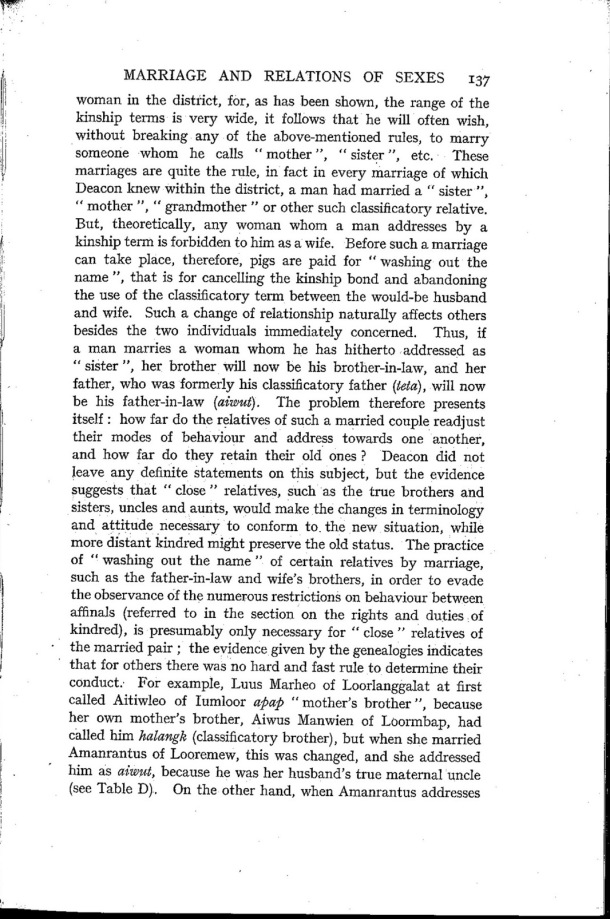|
|  [Note: this transcription was produced by an automatic OCR engine]
Y?“
-—i—~<4—_:
1
!
.,
MARRIAGE AND RELATIONS OF SEXES 137
woman in the district, for, as has been shown, the range of the
kinship terms is very wide, it follows that he will often wish,
without breaking any of the above-mentioned rules, to marry
someone whom he calls “ mother â€ù, " sister ", etc. These
marriages are quite the rule, in fact in every marriage of which
Deacon knew within the district, a man had married a â€ù sister “,
" mother â€ù, “ grandmother â€ù or other such classiï¬Åcatory relative.
But, theoretically, any woman whom a man addresses by a
kinship term is forbidden to him as a wife. Before such a marriage
can take place, therefore, pigs are paid for "washing out the
name â€ù, that is for cancelling the kinship bond and abandoning
the use of the classiï¬Åcatory term between the would-be husband
and wife. Such a change of relationship naturally affects others
besides the two individuals immediately concerned. Thus, if
a man marries a woman whom he has hitherto addressed as
" sister ", her brother will now be his brother-in-law, and her
father, who was formerly his classiï¬Åcatory father (feta), will now
be his father-in-law (aiwut). The problem therefore presents
itself : how far do the RELATIVES of such a married couple readjust
their modes of behaviour and address towards one another,
and how far do they retain their old ones? Deacon did not
leave any deï¬Ånite statements on this subject, but the evidence
suggests that “ close â€ù RELATIVES, such as the true brothers and
sisters, uncles and aunts, would make the changes in terminology
and attitude necessary to conform to. the new situation, while
more distant kindred might preserve the old status. The practice
of "Washing out the name " of certain RELATIVES by marriage,
such as the father-in-law and wife's brothers, in order to evade
the observance of the numerous restrictions on behaviour between
afï¬Ånals (referred to in the sectionon the rights and duties of
kindred), is presumably only necessary for “ close " RELATIVES of
the married pair ; the evidence given by the genealogies indicates
that for others there was no hard and fast rule to determine their
conduct.- For example, Luus Marheo of Loorlanggalat at ï¬Årst
called Aitiwleo of Iumloor apap "mother’s brother â€ù, because
her own mother's brother, Aiwus Manwien of Loormbap, had
called him halangk (classiï¬Åcatory brother), but when she married
Amanrantus of Looremew, this was changed, and she addressed
him as aiwut, because he was her husband's true maternal uncle
(see Table D). On the other hand, when Amanrantus addresses
|